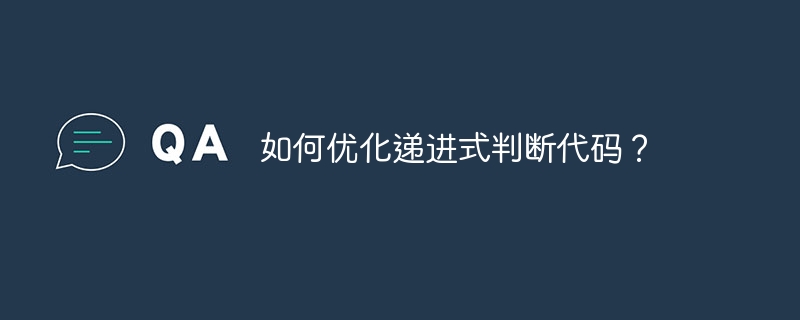如何优化递进式判断代码?

优化递进式判断代码的两种方案
给定代码中递进式判断存在冗余,可以通过两种优化方案来改善:
方案一:利用位向量
将字符判断结果用位向量表示:
/** * 都不为空 */ private static final int code_condition_one = 0000; /** * abc不为空 d为空 */ private static final int code_condition_two = 0001; private static final int code_condition_three = 0011; private static final int code_condition_four = 0111; private static final int code_condition_five = 1111;
然后重构方法如下:
private static void test(string a,string b,string c,string d){
switch (init(a,b,c,d)){
case code_condition_one:
// do something ...
break;
case code_condition_two:
//do something ...
break;
case code_condition_three:
//do something ...
break;
case code_condition_four:
//do something ...
break;
case code_condition_five:
//do something ...
break;
}
}
private static int init(string ... allparam){
if(allparam == null){
return 1;
}
string resultnumberstr = "";
for (string s : allparam) {
resultnumberstr += stringutils.isnotempty(s) ? 0 : 1;
}
return integer.valueof(resultnumberstr);
}方案二:反射+指令映射表
@Getter
class SolutionTwo{
private static Object result;
@Data
private static class Action{
/**
* 目标类
*/
private Class targetInvokeClass;
/**
* 目标类中目标方法
*/
private String targetMethodName;
/**
* 参数类型
*/
private Class[] parameterTypes;
/**
* 目标方法参数对象
*/
private Object[] params;
/**
* 是否是当前类中方法
*/
private boolean isCurrentClass;
/**
* 是否方法不需要参数
*/
private boolean isNoParams;
public Action(){
}
public Action(Class targetInvokeClass, String targetMethodName,Class[] parameterTypes, Object[] params, boolean isCurrentClass, boolean isNoParams) {
this.targetInvokeClass = targetInvokeClass;
this.targetMethodName = targetMethodName;
this.parameterTypes = parameterTypes;
this.params = params;
this.isCurrentClass = isCurrentClass;
this.isNoParams = isNoParams;
}
}
/**
* 映射Map
* 泛型Object是指令,
* 泛型Action是指令对应的执行方案
*/
private static final HashMap<Object,Action> ACTION_MAP = new HashMap<>(16);
static class ResultAction{
public void helloWorld(String name){
System.out.println(name + ",你好世界");
}
}
static {
//都不为空
ACTION_MAP.put(0,new Action(ResultAction.class,"helloWorld",new Class[]{String.class},new String[]{"我是张三"},false,false));
//abc不为空 d为空
ACTION_MAP.put(1,new Action(ResultAction.class,"helloWorld",new Class[]{String.class},new String[]{"我是李四"},false,false));
//ab不为空 cd为空
ACTION_MAP.put(11,new Action(ResultAction.class,"helloWorld",new Class[]{String.class},new String[]{"我是王五"},false,false));
//a不为空 bcd为空
ACTION_MAP.put(111,new Action(ResultAction.class,"helloWorld",new Class[]{String.class},new String[]{"我是赵六"},false,false));
//abcd都为空
ACTION_MAP.put(1111,new Action(ResultAction.class,"helloWorld",new Class[]{String.class},new String[]{"我是张三他爹"},false,false));
}
private static void test(String a,String b,String c,String d){
int result = init(a, b, c, d);
Action action = ACTION_MAP.get(result);
if(action != null){
handler(action);
}else{
System.out.println("未找到对应映射键");
}
}
private static void handler(Action action) {
try {
Method method = null;
Class cls = null;
if (action.isCurrentClass()) {
method = getMethod(SolutionTwo.class,action.getTargetMethodName(),action.getParameterTypes());
cls = SolutionTwo.class;
}else{
Class targetClass = action.getTargetInvokeClass();
method = getMethod(targetClass, action.getTargetMethodName(), action.getParameterTypes());
cls = action.getTargetInvokeClass();
}
result = method.invoke(cls.newInstance(), action.getParams());
} catch (NoSuchMethodException | IllegalAccessException | InvocationTargetException | InstantiationException e) {
e.printStackTrace();
}
}
private static Method getMethod(Class cls,String methodName,Class[] parameterTypes) throws NoSuchMethodException {
return cls.getMethod(methodName,parameterTypes);
}
private static int init(String ... allParam){
if(allParam == null){
return 1;
}
String resultNumberStr = "";
for (String s : allParam) {
resultNumberStr += StringUtils.isNotEmpty(s) ? 0 : 1;
}
return Integer.valueOf(resultNumberStr);
}
}以上就是如何优化递进式判断代码?的详细内容,更多请关注其它相关文章!
